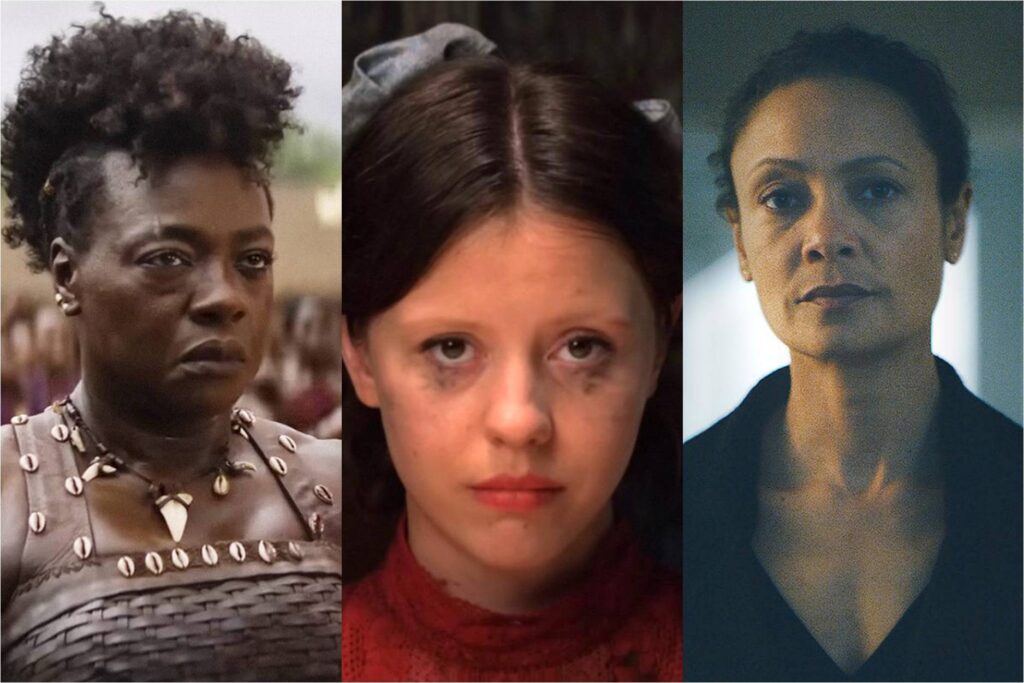
Women are fighting back. Well, at least at the movies. Women aren’t a monolith on screen or off, but this past weekend’s new theatrical releases were striking for how they centralized female characters, and how they placed them in varying postures of defiance. At the cinema, the fairer sex is through with unfairness.
The most ambitious of these movies, The Woman King, is also the most conventional. Directed by Gina Prince-Bythewood from a script by Dana Stevens, it’s an old-fashioned historical epic, in the vein of Spartacus or (for a more recent vintage) Gladiator. And when it comes to women fighting, its depiction is quite literal: It tells the story of the Agojie, a troop of female soldiers for the Dahomey kingdom in nineteenth-century West Africa. Led by the fearsome Nanisca (a reliable Viola Davis), they wage war against a rival empire—not out of territorial bloodlust, but out of desire to prevent their citizens from being conscripted into slavery.
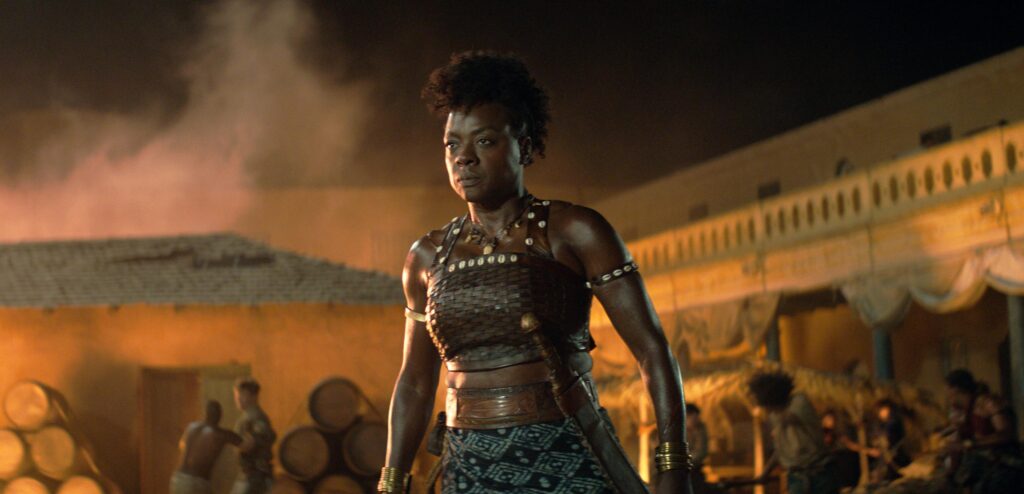
A strong lead actor, a true-ish story of palace intrigue, plenty of sword-and-sandals skull-thumping—all of the elements are in place here for a piece of rousing populist entertainment. So it’s disappointing that The Woman King is as muddled as it is triumphant. In her best works (Love & Basketball, Beyond the Lights), Prince-Bythewood has revitalized classic tropes with delicate attention to character, but here she struggles to find her rhythm, undone by clunky subplots and stiff clichés. Many of the narrative developments—a forbidden romance, a genealogical revelation, a Bachelor-flavored rivalry—are half-formed or trite. Thematically, meanwhile, the screenplay posits that Black leaders were partially culpable for the slave trade; the suggestion is provocative, but regardless of its historicity, it’s clumsily sketched, leaving a sour aftertaste.
The movie works better as a straightforward platoon picture and actioner. One of its threads involves the recruitment of a young would-be warrior (Thuso Mbedu, from Barry Jenkins’ Underground Railroad series), and her struggles to prove herself as a soldier and a leader pleasurably recall An Officer and a Gentleman. (Elsewhere, Lashana Lynch is very good as one of Nanisca’s lieutenants, combining her fluid physicality with a certain sparky brashness.) And while the fight sequences lack the snappy precision that Prince-Bythewood brought to The Old Guard, they mostly manage to be energetic and visceral without succumbing to hyperactive incoherence.
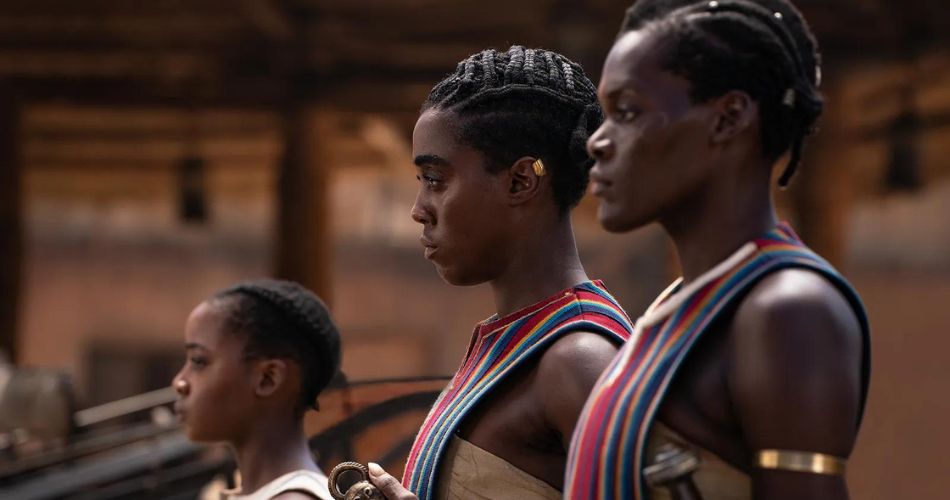
The Woman King appears to be a relative smash—it’s earned largely positive reviews, it made nearly $20 million last weekend, and it’s already receiving indefinable buzz as a possible Best Picture nominee—a development I find both pleasing and perplexing. I’m very happy when films of this type are profitable, and I hope its success encourages similar productions, in particular those directed by and starring Black women. At the same time, I can’t help but wish the movie were, well, better. It features some impressive moments—the surprising death of one character hit me harder than I’d expected—but on the whole its execution is too blurry to be satisfying. Despite Davis’ committed turn in the title role, The Woman King is less regal than provincial.
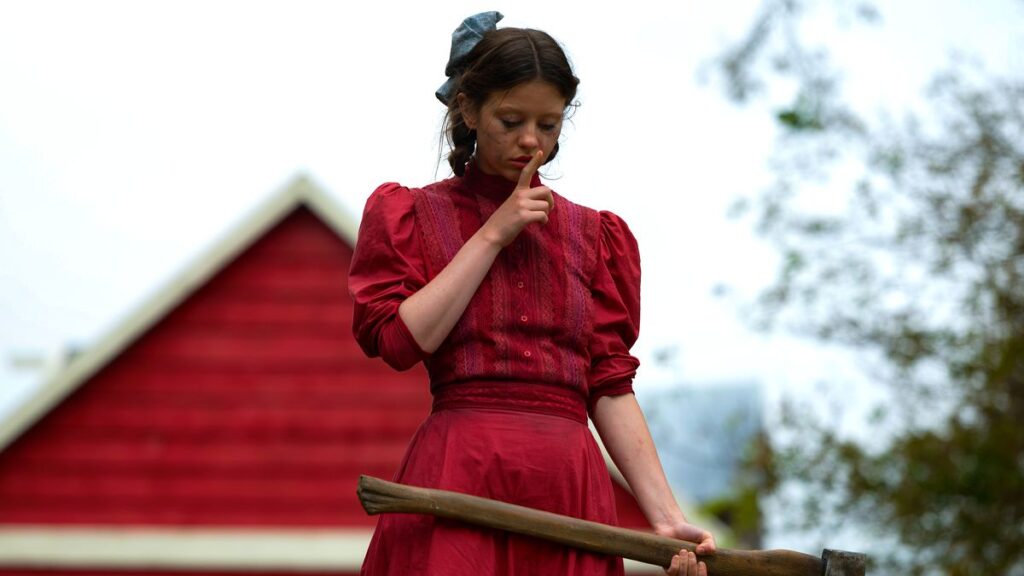
For a more sharply focused portrait of a woman wielding various bladed weapons, consider Ti West’s Pearl. Six months ago, West shook up the horror community with X, a crackling exploitation thriller set in the late ’70s and featuring Mia Goth in two roles: one as a nervy ingénue hungering for fame in the adult-film industry, the other as a decrepit housewife nursing her own disturbing cravings. Pearl, whose title doubles as the latter character’s name, and whose existence was teased in a post-credits scene (which I assumed at the time was a playful joke), is X’s prequel, rewinding six decades and exploring how its villain acquired her murderous impulses—or whether she was just born with them. (Filmed in the thick of COVID, it’s set during the 1918 flu pandemic; the numerous shots of characters wearing masks carry extra, presumably purposeful juice.)
It doesn’t take long for Pearl to announce itself as a winking exercise; the old-timey title sequence, with its ornate font and saturated colors, concludes with Goth’s moony farm girl grabbing a familiar-looking pitchfork and introducing an unfortunate duck to a ravenous alligator. And the movie’s opening act, which finds the overalls-clad Pearl chafing against the iron rule of her inflexible mother (Tandi Wright), is a bit too silly for its own good. The tone is intentionally absurd, but aside from a delirious sequence where Pearl has her way with a helpless scarecrow, the images don’t pop, and the desultory scenes of her rural misery fall into a grey zone somewhere between sobriety and camp.
Over time, however, something strange happens: Pearl becomes emotionally engrossing. It isn’t as though West dials down his trademark showmanship; to the contrary, as the genre requires, he loads up on outré set pieces—the scene in which Pearl auditions as a chorus girl, her mind transforming her solo act into a demented ensemble piece, is particularly heightened—and grisly violence. Yet as Pearl descends deeper into madness, Pearl grows more attuned to her behavior, locating the pervasive sorrow that festers beneath her abiding rage.
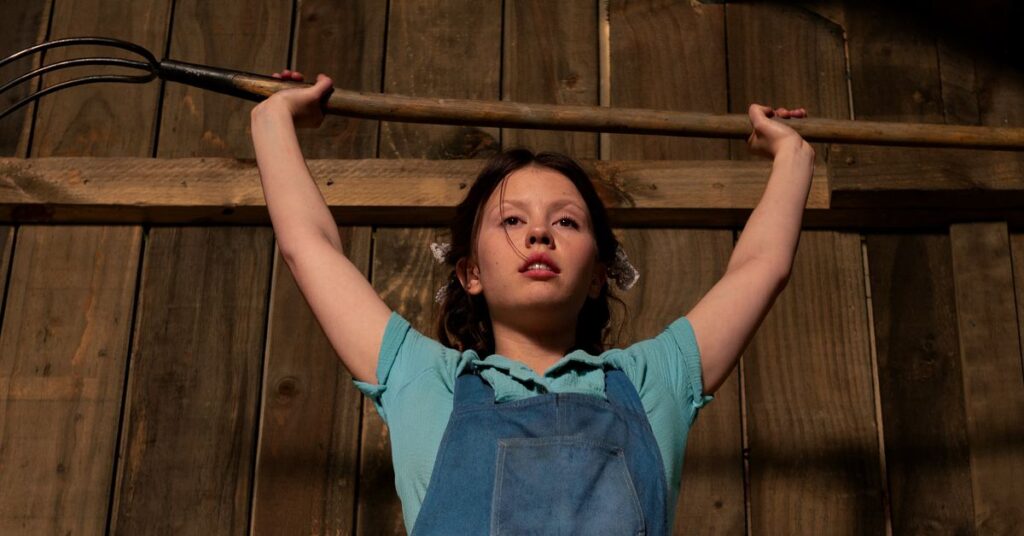
The keystone here, as it was in X, is Goth. No longer playing multiple parts (though she receives several additional off-camera credits, including co-writer and executive producer), she throws herself into the title character’s delusions while still exhibiting glimmers of humanity. The obvious highlight is a lengthy monologue (the internet clocked it at nine minutes) in which Pearl reflects on her sacrifices and her dreams; it’s a remarkable scene not so much for the quality of the dialogue as the arresting sincerity of the performance, and it’s weirdly thrilling to watch an actor commit so thoroughly to her craft.
For his part, West continues to defy the odds: Where most horror endings wilt into shrieky predictability, he delivers a climax that hums with energy and ingenuity. Pearl isn’t conventionally suspenseful—it being a prequel, there’s little doubt about its narrative trajectory—but West flips that obstacle into an asset; freed from the obligation to shock, he channels his gifts into pure filmmaking, with fluid camera moves, burning bodies, and a bravura mirrored sequence. He and Goth even flaunt the audacity to ape Michael Clayton for the movie’s final shot, and why not? Few images are more compelling than that of a beautiful, heartbroken woman’s possessed face.
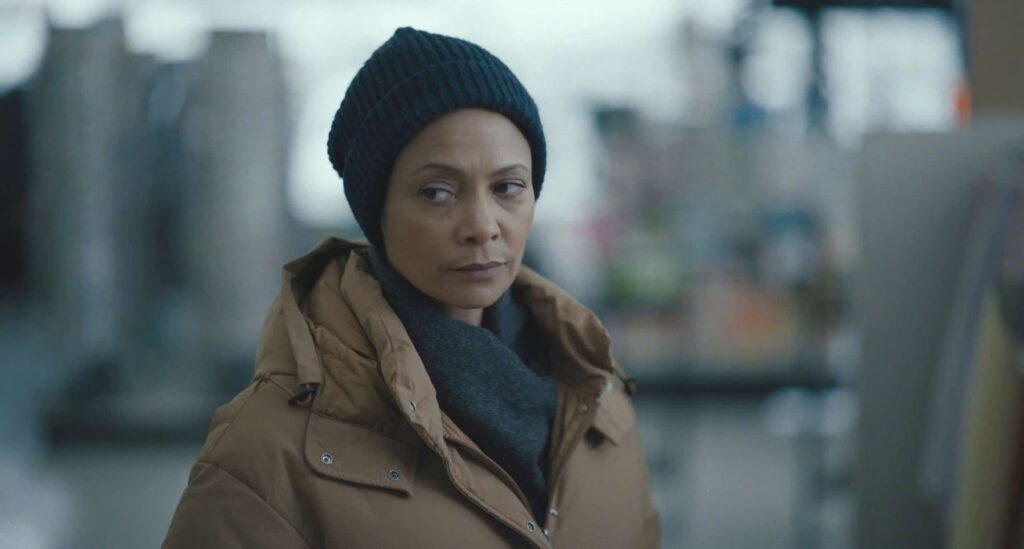
The feminine anger at the heart of God’s Country is less histrionic, though its persistent simmer carries its own chilling charge. Set in the cold hinterlands of Western Montana, it centers on Sandra (a remarkable Thandiwe Newton), a college professor who opens the picture attending the solemn cremation of her mother. Sandra’s life is isolated, but despite her recent bereavement, she seems reasonably happy; she’s well-liked by her students, she’s respected by her colleagues, and she owns a handsome house with a cute dog. Her existence may not quite be idyllic, but it’s certainly peaceful. Then things change.
Directed by Julian Higgins from a script he wrote with Shaye Ogbonna, God’s Country is both spare and ambitious, tightly paced yet still making room for broad swaths of thematic inquiry. The plot involves Sandra’s escalating tensions with a pair of hunters, which begins with a minor trespass and a friendly note, then slowly ratchets up to more fraught confrontations. Higgins’ shooting style is restrained and precise, and he lets the forbidding location do some of the work for him; the sequence in which Sandra and a hapless sheriff (Jeremy Bobb) find themselves cornered by menacing, chainsaw-bearing locals throbs with incipient violence, the surrounding evergreens looming like deadly spikes.
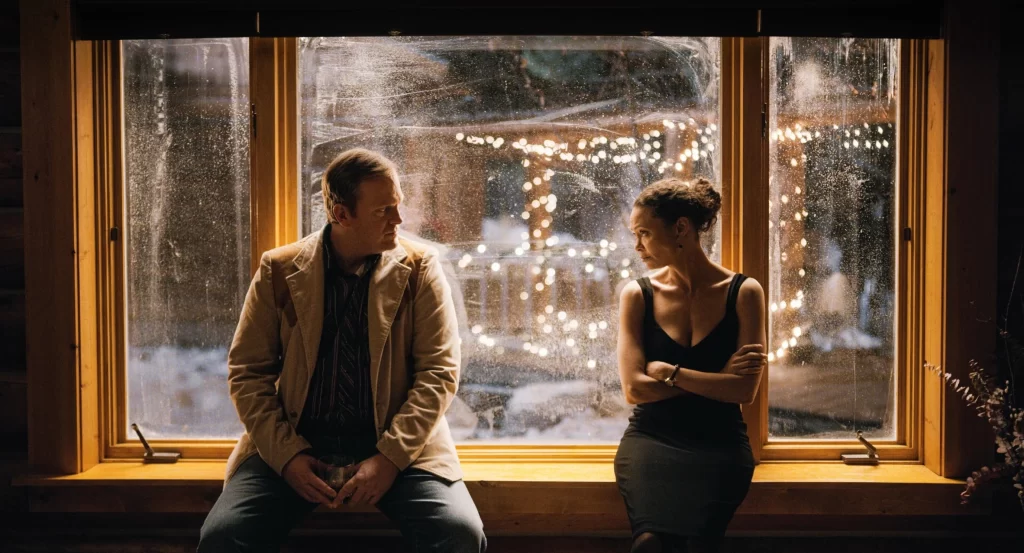
Yet for all its mounting anxiety, God’s Country isn’t really a thriller—or at least, it isn’t only a thriller. It’s also concerned with matters of race, class, and sex, and it examines these issues in a way that’s more nuanced than a writer checking off a list of progressive talking points. The only Black person in sight (and possibly within a hundred miles), Sandra finds herself enmeshed in a struggle with the academic establishment to improve diversity, and the details of her intellectual combat—the wielding of the word “quota,” the virtue signaling of an ostensible ally, the deflating and dehumanizing tokenism (responding to Sandra’s pesky insistence, an exasperated colleague shouts, “You’re here!”)—are uncommonly astute. There’s also a thread involving sexual impropriety, and here too the particulars—the mapping of the toxic intersection of uncertainty, entitlement, and shame—evade the trap of shrill moralizing. (For all of the prevailing distress—animal lovers, expect to cover your eyes repeatedly—Higgins does provide a few moments of gentleness and beauty, as when Sandra shows up at a holiday party in a knockout black cocktail dress.)
God’s Country doesn’t always integrate all of these elements seamlessly, and while its narrative acquires a ruthless momentum, its finale strains credibility (despite being smoothly orchestrated). But as a character study, it’s riveting, largely thanks to Newton. Sandra is one of the most complex female personas to grace screens in some time, and Newton rounds out her desires without softening her edges; the blazing intelligence and fiery resolve are almost to be expected from the Westworld star, but she somehow mingles them with notes of sadness, hesitation, and regret. It’s an extraordinary performance, one that makes me wonder whether the movie’s ending is less questionable than inevitable. Quibbles of realism aside, the potency is undeniable, and maybe even logical. Here’s what happens when, in a place where prejudice blankets the ground like snow, one unconquerable woman finally decides she’s had enough.
Grades
The Woman King: C+
Pearl: B
God’s Country: B+
Jeremy Beck is the editor-in-chief of MovieManifesto. He watches more movies and television than he probably should.
